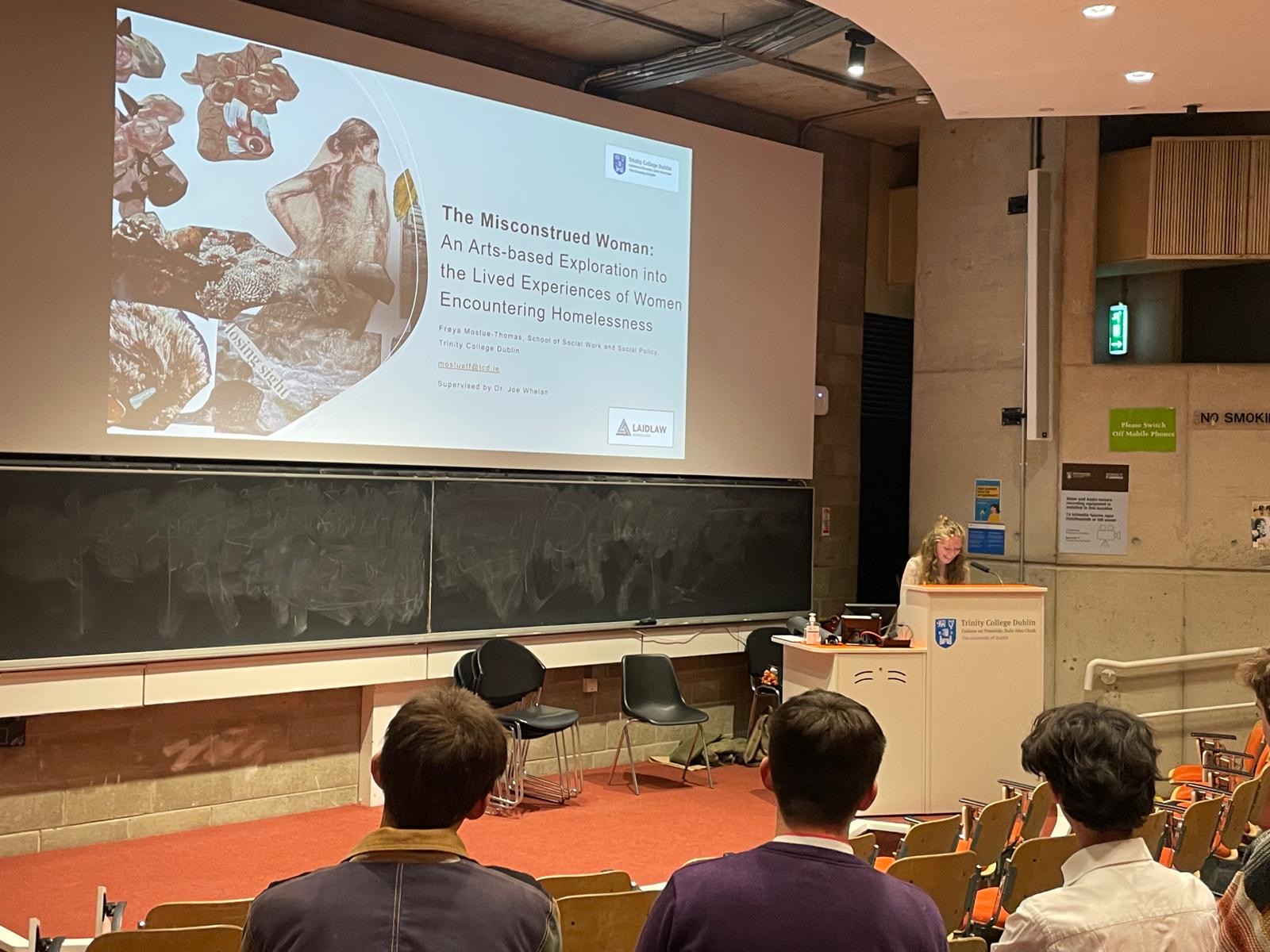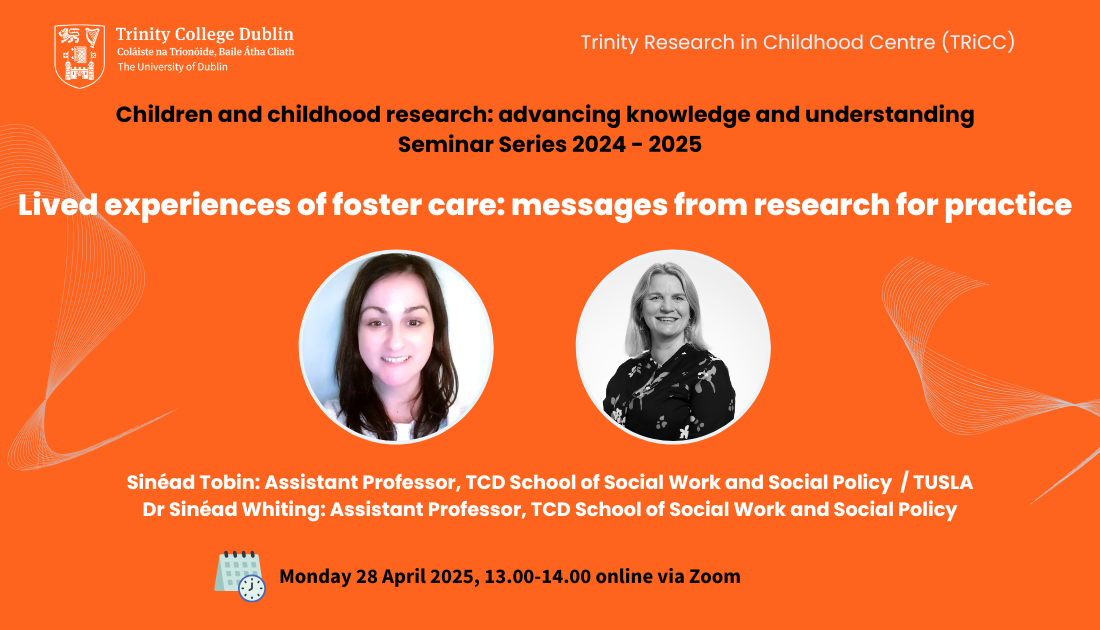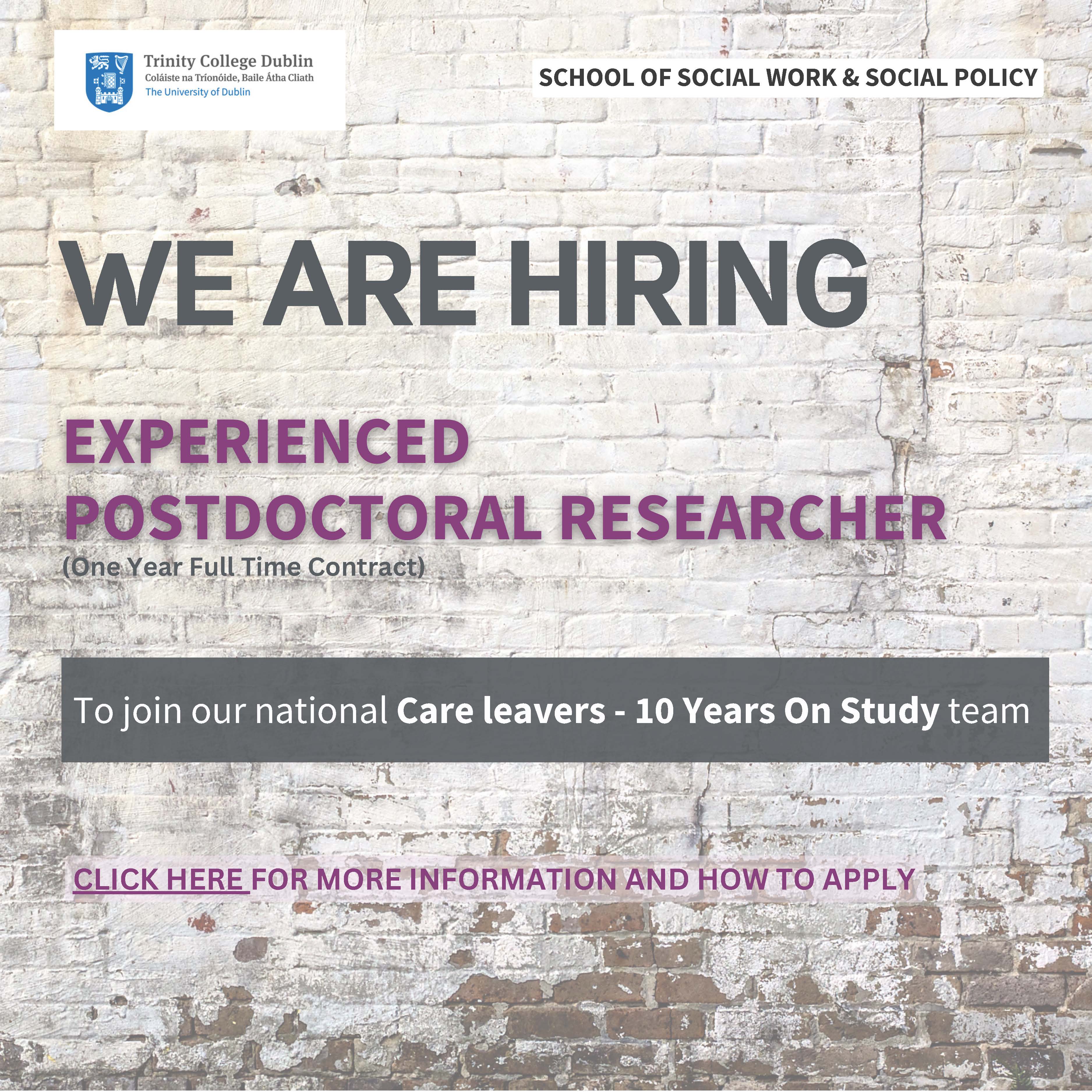Latest News
Congratulations to Dr Simone McCaughren who presented her report entitled 'the operation of the in camera rule in irish family law' to the Minister for Justice
The Minister for Justice attended a report launch with Dr Simone McCaughren and her colleagues Dr Aisling Parkes and Dr Kenneth Burns UCC. They presented findings from their report into The Operation of the In Camera Rule in Irish Family Law at the Family Justice Forum event in the Department of Justice. The full report will be published very shortly.
Coverage of the event can be viewed here:
April 29, 2025
Congratulations to our M.Sc. in Applied Social Research class of 2024 who graduated today.

Warm congratulations to everyone who graduated today. We hope you have a wonderful day celebrating your success and we wish you the very best for the future.
April 16, 2025
Professor Emeritus Robbie Gilligan recently made a presentation on 'Leaving Care - What Next?

Professor Emeritus Robbie Gilligan recently made a presentation on 'Leaving Care - What Next?' at the European Parliament. He was an invited presenter to the joint hearing of the Committee on Legal Affairs and the Committee on Employment and Social Affairs of the European Parliament. This joint hearing which was entitled the “Protection and promotion of the rights of children placed in alternative care” was held on March 18th. A video clip of the presentation is available at the following link: https://shorturl.at/48QeT
April 07, 2025
The misconstrued woman: A research and documentary film launch
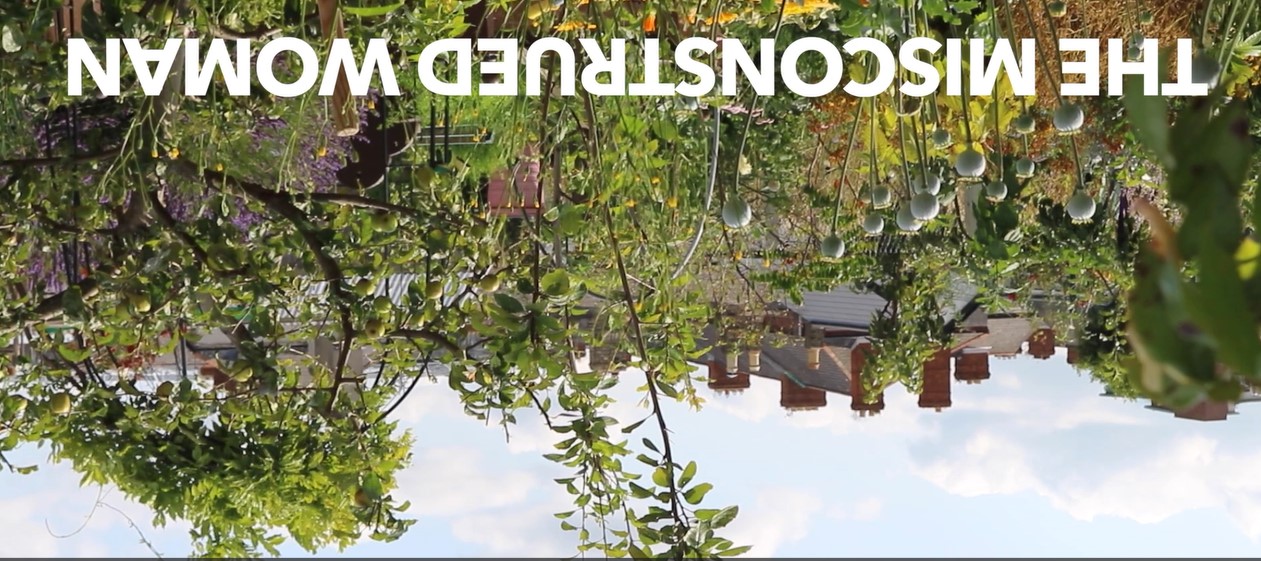
On Wednesday 26th of March, The School of Social Work and Social Policy was proud to host the launch of The Misconstrued Woman, a research project conducted by Laidlaw Scholar and BSS student, Frøya Mostue-Thomas under the supervision of Dr Joe Whelan. The launch event included a display of the collages made by research participants, an overview of the research and the premier of a documentary film that viscerally explores lived experiences of women's homelessness.
The event was huge success with a packed Robert Emmett Theatre giving a standing ovation to Frøya as film director. After a Q&A session, the event was closed with some thought-provoking words from Head of the School of Social Work and Social Policy, Dr Catherine Conlon.
April 01, 2025
Marian Lynch Medal Winners
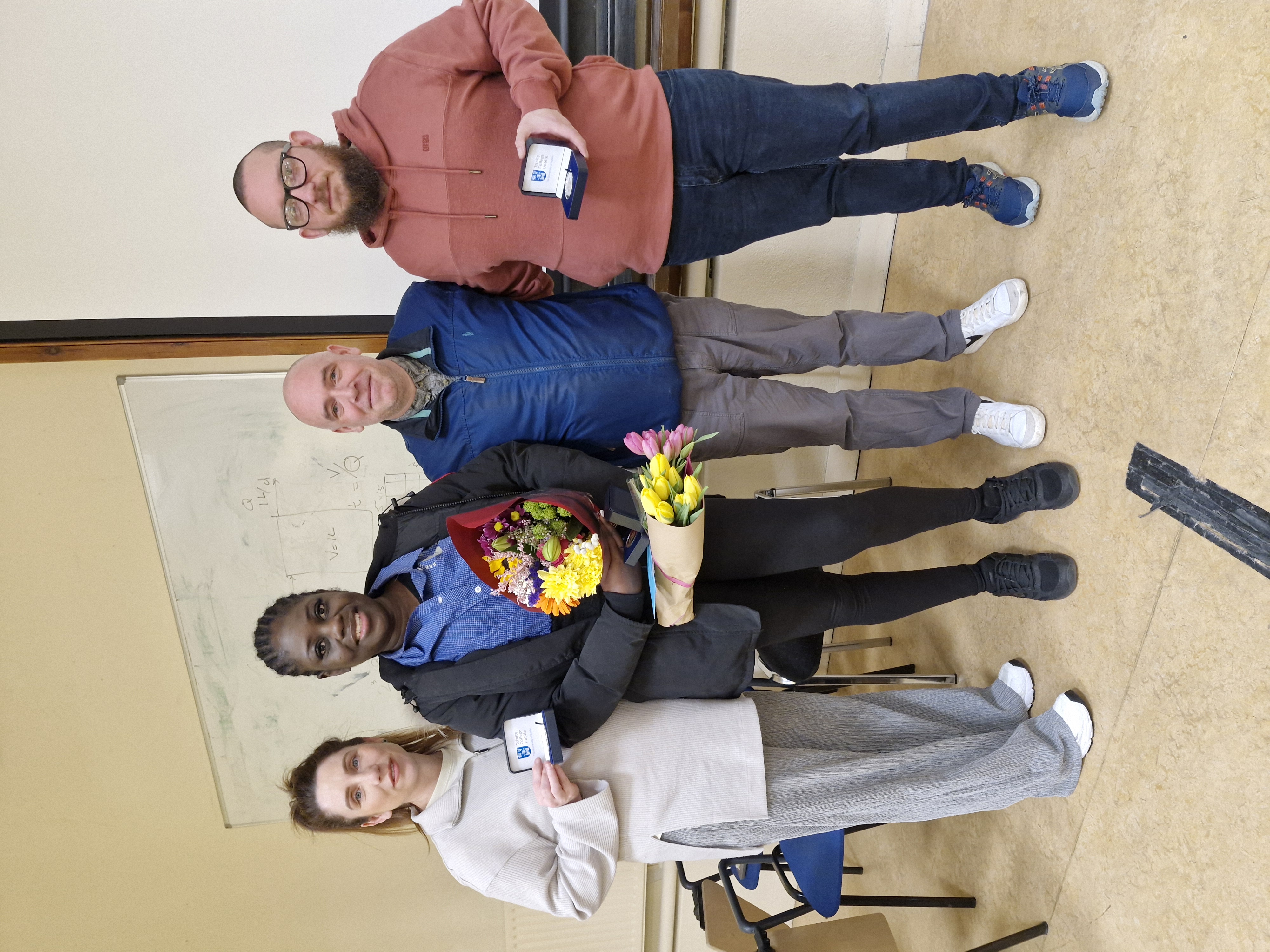
Congratulations to our most recent Marian Lynch medal winners who were presented with their medals by course director, Joe Whelan.
This award was commissioned in 2006 by classmates of Marian Lynch, a Junior Sophister BSS student who died in May of that year. Marian greatly enjoyed her course, in particular the Community Work module which reflected her deep affection for and commitment to her own community, the Liberties. Each year, the medal is awarded to each member of the group who achieve the highest mark in the Senior Fresh Community Work project .
Pictured left to right; Lynsey Boylan , Adefunke Agbabiaka, Joe Whelan (Course Director) and James Carey.
Well done!
March 27, 2025
First-year PhD Student Danielle Young awarded a grant from the European Society of Contraception and Reproductive Health
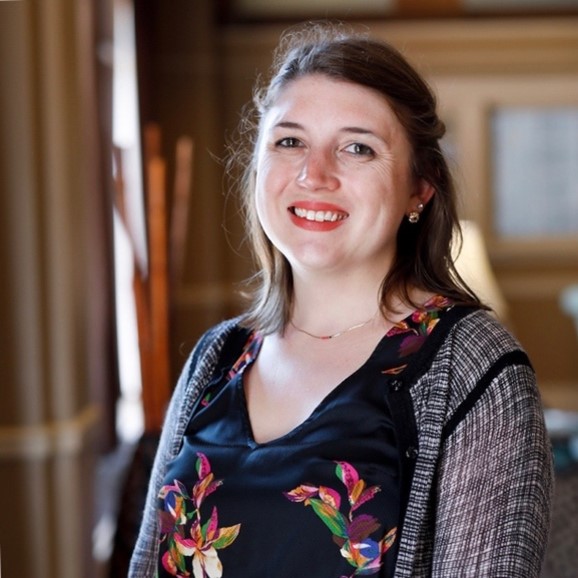
First-year PhD Student Danielle Young, supervised by Dr. Louise Caffrey and Dr. Catherine Conlon, has been awarded a grant from the European Society of Contraception and Reproductive Health. This grant will be used to develop a data collection infrastructure for GP administered early medical abortion in Ireland. This work is part of ongoing work of Catherine Conlon in partnership with the Southern Task-Force on Abortion a Reproductive Topics (START), a GP-led group of abortion providers in Ireland, to improve and monitor abortion service delivery.
March 25, 2025
Lived Experiences of Foster Care:Messages from Research for Practice
Join us for the next TRiCC seminar online (Zoom) on Monday 28th April at 1pm. Chaired by Dr Yekaterina Chzhen and presented by Sinéad Tobin and Dr Sinéad Whiting, the seminar will focus on children’s lived experience of foster care.
Register here: https://tcd-ie.zoom.us/webinar/register/WN_G247js9ITSSx41PUDpR2dQ
Sinéad Tobin’s presentation will draw on findings from two research projects relating to foster care placement breakdown. In contrast to the dominant quantitative knowledge base on this topic, Sinéad’s presentation will focus on children and young people’s lived experiences of placement breakdown. The presentation will conclude with offering key messages for practice.
Dr. Sinéad Whiting’s presentation will explore findings from a qualitative study involving 22 young adults who grew up in foster care with permanence in Ireland. The presentation will focus on the participants' descriptions of their relationships with their foster carers and the various ways they developed a sense of permanence throughout their time in long-term foster care. It will highlight the co-creation of permanence between the young adults and their foster carers, offering insights into the dynamics that contributed to their sense of stability and belonging.
March 24, 2025
14th European Conference for Social Work Research (ECSWR)
 Associate Professor Susan Flynn, Assistant Professors Erna O'Connor, Sinéad Whiting and Sinéad Tobin and Kevin Ryan, Senior Social Work Practitioner, St James’ Hospital, Dublin and external contributor to the BSS and MSW programmes, participated in the 14th European Conference for Social Work Research (ECSWR) which took place from 12-14 March 2025, at the Katholische Stiftungshochschule, Munich, Germany. The ECSWR is the biggest annual social work research event in Europe. This year's conference theme was "Embracing Democracy in Social Work Practice and Research"
Associate Professor Susan Flynn, Assistant Professors Erna O'Connor, Sinéad Whiting and Sinéad Tobin and Kevin Ryan, Senior Social Work Practitioner, St James’ Hospital, Dublin and external contributor to the BSS and MSW programmes, participated in the 14th European Conference for Social Work Research (ECSWR) which took place from 12-14 March 2025, at the Katholische Stiftungshochschule, Munich, Germany. The ECSWR is the biggest annual social work research event in Europe. This year's conference theme was "Embracing Democracy in Social Work Practice and Research"
Presentations from the School of SWSP were as follows:
A policy content analysis of 'Children First: National Guidance for the Protection and Welfare of Children' (2017) examining the utility and relevance of Children First for disabled children.
Dr Susan Flynn, School of Social Work & Social Policy, Trinity College, Dublin.
Mr Haocheng Shi, School of Social Work & Social Policy, Trinity College, Dublin.
Experiences of a tutor-led, pilot placement programme in a healthcare context, through a Communities of Practice lens.
Dr Erna O’Connor & Dr Sinead Whiting, School of Social Work & Social Policy, Trinity College, Dublin.
Ms Paula Markey & Mr Kevin Ryan, Social Work Service, St James’ Hospital, Dublin.
Ms Jo Greene, PhD Research Scholar, the SPHeRE Programme
Permanence Display : Evidence of the co-creation of permanence in long-term foster care
Dr Sinéad Whiting, School of Social Work & Social Policy, Trinity College, Dublin.
Opening the Doors: a practitioner in academia and an academic in practice
Ms Sinead Tobin, School of Social Work and Social Policy, Trinity College Dublin & Principal Social Worker, Office of Chief Social Worker, Tusla Child and Family Agency.
March 24, 2025
Congratulations to SWSP PhD students
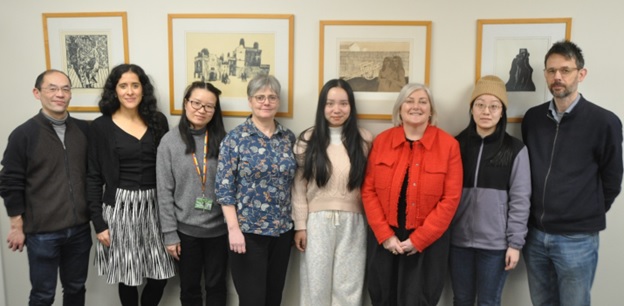
Congratulations to SWSP PhD students, Wenyu Li and Jianing Zhu who presented on their research at the I-ARoA (Ireland's Network on Research on Ageing in Asia) seminar on 14 February 2025 at the UCD Geary Institute for Public Policy. Both presentations were very well received by the attendees from across multiple academic disciplines and NGO’s. Ireland's Network of Research on Ageing in Asia (I-ARoA) was founded in 2023 by Dr Catherine Elliott O’Dare, School of Social Work and Social Policy TCD and Dr Naonori Kodate, School of Social Policy, Social Work and Social Justice, UCD. The aims of I-ARoA are to connect PhD scholars in Ireland researching ageing in Asia and their supervisors, provide a supportive and collaborative network for members, and provide opportunities for members to share expertise, knowledge, and experience. It achieves these aims through regular network meetings and organising research-focused events. TCD, UCD and Maynooth University comprise current membership. New members are welcome, please contact Catherine at elliot@tcd.ie if you are interested in joining the network.
March 21, 2025
Prosperity without Growth - Public Lecture and Discussion

The School of Social Work & Social Policy is delighted to host Professor Mario Pansera who will deliver a public lecture entitled Prosperity with Growth. This is a free event and full details and tickets can be found here
March 19, 2025
Sherie de Burgh commemorative seminar jointly hosted by One Family and the School of Social Work and Social Policy
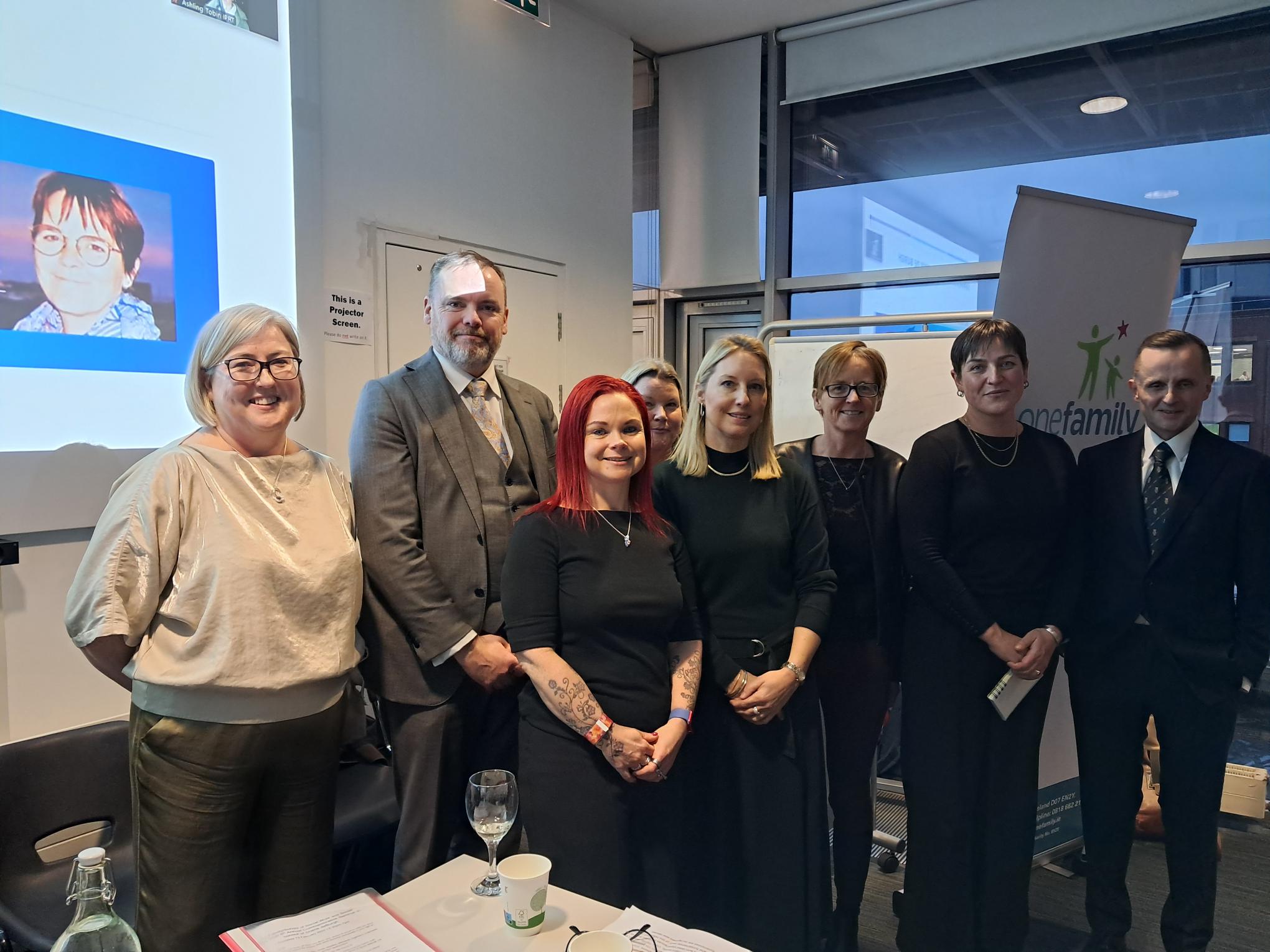
The theme for this year’s Sherie de Burgh commemorative seminar jointly hosted by One Family and the School of Social Work and Social Policy in Trinity College Dublin was ‘Contact with Children Following Separation: Practice to Policy NGO–TCD Research Collaborations’.
Dr Simone McCaughren led the One Family commissioned research project which formed the focus for this year's commemoration lecture. This research resulted in the publication of an interdisciplinary report and Guidance on Contact Time for Infants and Young Children in Separated Families. Together with Professor Stephanie Holt, Dr Aisling Parkes (School of Law, UCC) and Soma Gregory (Research Assistant), this ground-breaking piece of work provided a cross disciplinary perspective spanning social work/policy, law and psychology of the considerations for very young children in family law proceedings in Ireland. This ambitious research study was empirical in nature and engaged with various dimensions of the legal system, which has been untouched by research to date.
Chaired by the Head of School, Dr Catherine Conlon, speakers included: Dr Simone McCaughren (Principal Investigator of Research Report: Contact time for infants and young children in separated families); Geraldine Kelly, One Family’s Director of Parenting and Professional Development Services; Andrew Munro – Head of Policy and Legislation for Civil Justice, Assistant Secretary General in the Department of Justice overseeing the development of the Family Justice Reform; His Honour Judge Geoffrey Shannon – Former Law Society director and current Circuit Court judge, Dr Shannon was Special Rapporteur on Child Protection for the Irish Government 2006-19 and is the author independent report into historical child sex-abuse allegations in St John Ambulance 2023. The full research team joined a panel discussion chaired by Prof Stephanie Holt and the event was closed by Karen Kiernan, CEO of One Family.
Sherie was a person of infinite compassion particular for anyone encountering bumps in life’s path which remains the core of One Family’s work who are at the coalface of practice working with children and families navigating very complex systems, and oftentimes experiencing social injustice. One Family understand that knowledge production is a shared endeavour, and that building knowledge is not just a one-way flow, it is a collaborative iterative process and is intended to build new knowledge for the purpose of taking social action. Most importantly, One Family, respect the voices of those with lived experiences and see them as an essential and fundamental part of the research process – where experiences are recognised and valued.
And so this research grew from the ground up. It attempted to gain a bird’s eye view of how and in what ways, contact arrangements for infants and young children in the 0-6 years are navigated where parents are parenting separately. In addition, it sought to understand how those arrangement are managed and how the perspectives of this young children can be listened to. The School of Social Work and Social Policy at TCD who collaborate with One Family commemorating Sherie annually were delighted this year to showcase a research partnership between the School and One Family. The large attendance and deep interest on the evening, combined with the policy and justice imperative of progressing this issue demonstrated by Andrew Monro talking from a Department of Justice perspective and Judge Geoffrey Shannon, talking from a judicial perspective highlighted to us the value of forums to discuss and debate this topic and we expect to come back to it in our Schools seminar series again soon. Watch this space!
March 4, 2025
Sixth Annual Sherie de Burgh Commemorative Event

The theme for this year’s event is: Contact with Children Following Separation: Practice to Policy NGO–TCD Research Collaborations.
The sixth annual Sherie de Burgh commemorative seminar jointly hosted by One Family and the School of Social Work and Social Policy in Trinity College Dublin will explore the experiences of one-parent families in Ireland and reflect on their joint research, which illustrates a practice-to-policy approach and can be accessed here:
Guidance on Contact Time for Infants and Young Children in Separated Families
Event Details
If you wish to attend this event in person on the day, please find the event details and registration form below.
Date: Thursday, 13 February 2025
Time: 5.30pm – 7pm
Programme
Registration will take place between 5pm – 5.30pm. Please come early to register your details and attendance in person only if have not pre-registered online using the form below.
Seminar: 5.30pm – 7pm
Reception: from 7pm
Location
Trinity Research in Social Sciences (TRiSS)
TRiSS Seminar Room
6th Floor, Sutherland Centre
Arts Building, Trinity College Dublin
Streaming link: on the day, the event will be available to watch on YouTube here .
Summer school opportunity to travel to Germany and learn about disability and child welfare!
Summer school opportunity to travel to Germany and learn about disability and child welfare! Limited spaces available, see here for more information and to apply by 1st of February.
Jan 16, 2025
Head of School and Associate Prof Catherine Conlon, together with Prof Virpi Timonen, University of Helsinki and Dr Geraldine Foley, School of Medicine, Trinity College have authored a new paper for the Qualitative Research Journal entitled 'Quality in qualitative research:a relational process
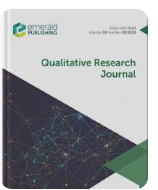 Head of School and Associate Prof Catherine Conlon, together with Prof Virpi Timonen, University of Helsinki and Dr Geraldine Foley, School of Medicine, Trinity College have a paper just out in Qualitative Research Journal entitled 'Quality in qualitative research: a relational process' available on Open Access here
Head of School and Associate Prof Catherine Conlon, together with Prof Virpi Timonen, University of Helsinki and Dr Geraldine Foley, School of Medicine, Trinity College have a paper just out in Qualitative Research Journal entitled 'Quality in qualitative research: a relational process' available on Open Access here
The paper argues that quality in qualitative research cannot be ensured with the help of checklists alone. We assert that quality in qualitative research is a set of relationships, threaded through the entire research process, between the researcher and the researched topic, participants, data, data analysis and audience. It sets out how the foundations of qualitative inquiry, across all paradigms, demand an engaged, committed researcher attending iteratively and with care – relationally – to every stage of the research process in pursuit of quality. The key novel contribution of this paper is its argument that adopting a relational ethic of commitment to quality at each stage of the research process is conducive towards high-quality qualitative research. The paper will be useful for established qualitative researchers, doctoral students, postgraduate and undergraduate students engaging in qualitative social research, in particular for its elaboration of parsimonious quality criteria specific to qualitative research.
Jan 14, 2025
Joe Whelan publishes a new textbook with Policy Press!
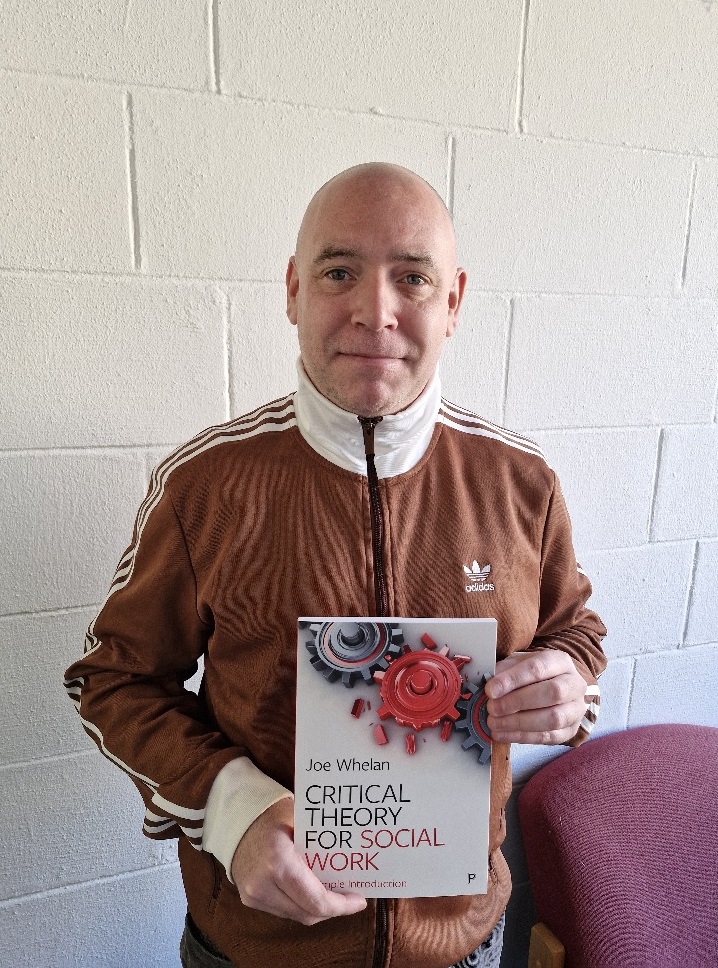
Joe Whelan's latest book 'Critical Theory for Social Work' is published and available. The books aims to introduce interested readers to Critical Theory in an accessible and interesting way. The companion website for the book is also live and includes a full lesson plan, a full and adaptable slide deck and a set of short explanatory video clips. The materials available on the companion website are designed for instructors to make the text easy to adopt as a core text for teaching social work students about critical social theory. The book and accompanying materials are designed to be accessible and to be used across jurisdictions, so please feel free to share widely and get in touch with Joe if you have any questions.
The book is published by Policy Press. To access materials and find out more about the book, see links below:
https://policy.bristoluniversitypress.co.uk/critical-theory-for-social-work
https://policy.bristoluniversitypress.co.uk/critical-theory-for-social-work/online-resources
https://www.youtube.com/playlist?list=PLP899GzKi9xV8JAUUrDqmCvHWlq89g3hD
Jan 8, 2025
Launch of Report on Sentencers’ Perspectives on Community Service Orders and Short Term Prison Sentences

A report on sentencers’ views of Community Service Orders (CSOs) and Short Term Prison Sentences co-written by Professor Nicola Carr, Chair of Social Work and Social Policy and Dr Niamh Maguire (SETU) was launched in the Department of Justice today (6th November). The report is based on research commissioned by the Department of Justice. The research explores the reasons for the continued use of sentences of short-term imprisonment, despite their known negative effects, and the relative under-use of community service orders in Ireland. The research, which includes a systematic review of literature and in-depth interviews with judges, finds that there are numerous barriers to the use of community service orders. The report makes a number of key policy recommendations including the need to review the current thresholds at which CSOs are set alongside their legislative status; reconsideration of suitability criteria for CSOs; increased resourcing and awareness raising and information sharing.
The report is available to download from the Department of Justice website here
Nov 7, 2024
Congratulations to School staff and colleagues on their publication ‘Children’s experiences of signs of safety: A scoping review
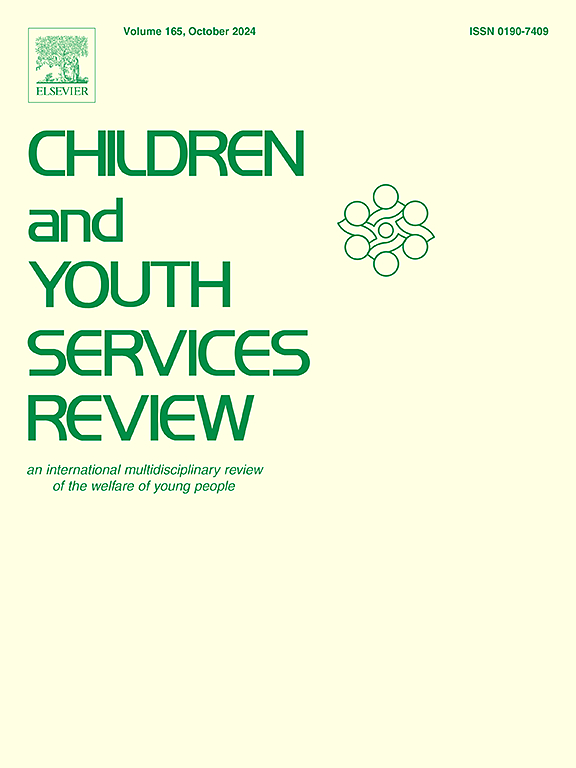 Congratulations to Dr Louise Caffrey, Dr Eavan Brady, Orla Keegan, Greg Sheaf, Siobhan Dunne, Prof Stephanie Holt, and Prof Emeritus Robbie Gilligan on their recent publication in Children and Youth Services Review. This scoping review identifies and synthesises the existing literature concerning children’s self-reported experiences of Signs of Safety and can be accessed for free until 24th December here.
Congratulations to Dr Louise Caffrey, Dr Eavan Brady, Orla Keegan, Greg Sheaf, Siobhan Dunne, Prof Stephanie Holt, and Prof Emeritus Robbie Gilligan on their recent publication in Children and Youth Services Review. This scoping review identifies and synthesises the existing literature concerning children’s self-reported experiences of Signs of Safety and can be accessed for free until 24th December here.
Nov 7, 2024
We are Hiring - Post Doctoral Researcher: Care Leavers - Ten Years On Project
We are delighted to announce we are hiring a Post Doctoral Research on the project Care Leavers - Ten Years On. Full details of the post and the application link can be found here
Oct 17, 2024
Professor Emeritus Robbie Gilligan contributes chapter on kinship care to major new publication on child and family social work research
 Professor Emeritus Robbie Gilligan has contributed a chapter to a major new international collection of 52 newly written chapters Routledge Handbook of Child and Family Social Work Research: Knowledge-Building, Application, and Impact . His chapter is entitled ‘Uncovering the relational complexity of kinship care – the power of qualitative research’. The chapter reviews research on issues relating to both relative care (formal care within child protection systems) and informal kinship care outside these formal systems.
Professor Emeritus Robbie Gilligan has contributed a chapter to a major new international collection of 52 newly written chapters Routledge Handbook of Child and Family Social Work Research: Knowledge-Building, Application, and Impact . His chapter is entitled ‘Uncovering the relational complexity of kinship care – the power of qualitative research’. The chapter reviews research on issues relating to both relative care (formal care within child protection systems) and informal kinship care outside these formal systems.
Oct 14, 2024
The School of Social Work & Social Policy celebrates Athena Swan Bronze Award Renewal
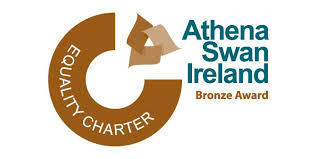
The School of Social Work & Social Policy are delighted to be awarded Bronze Renewal by Athena Swan Ireland. This achievement reflects the Schools impactful and sustained commitment to equality, diversity, and inclusion. It would not have been possible without a lot of hard work from the Athena Swan SAT comprised of:
- Mr Vitalis Bengano - PG Representative
- Dr Philip Curry - Social Policy
- Ms Rose Doolan Maher - PG Representative
- Dr Michael Feely - Social Work (Co-Chair)
- Dr Stephanie Holt - Social Work
- Ms Jennifer O'Toole - School Manager
- Ms Erin Paullin - School Administrative Staff Representative
- Dr Leigh-Ann Sweeney- Social Work (Co-Chair)
Holding an Athena Swan award is a criterion required by the Higher Education Authority, many Irish research funders and aligns with the European Commission eligibility requirements for accessing Horizon Europe research funding. SWSP is one of four Schools in the University awarded the honour. Full details can be found here
Sept 4, 2024
The ReproCit Project host a participatory seminar on "Self-determination & Reproductive Citizenship" at the Irish Museum of Modern Art on Thursday, 29 August 2024 11am-1.15pm.
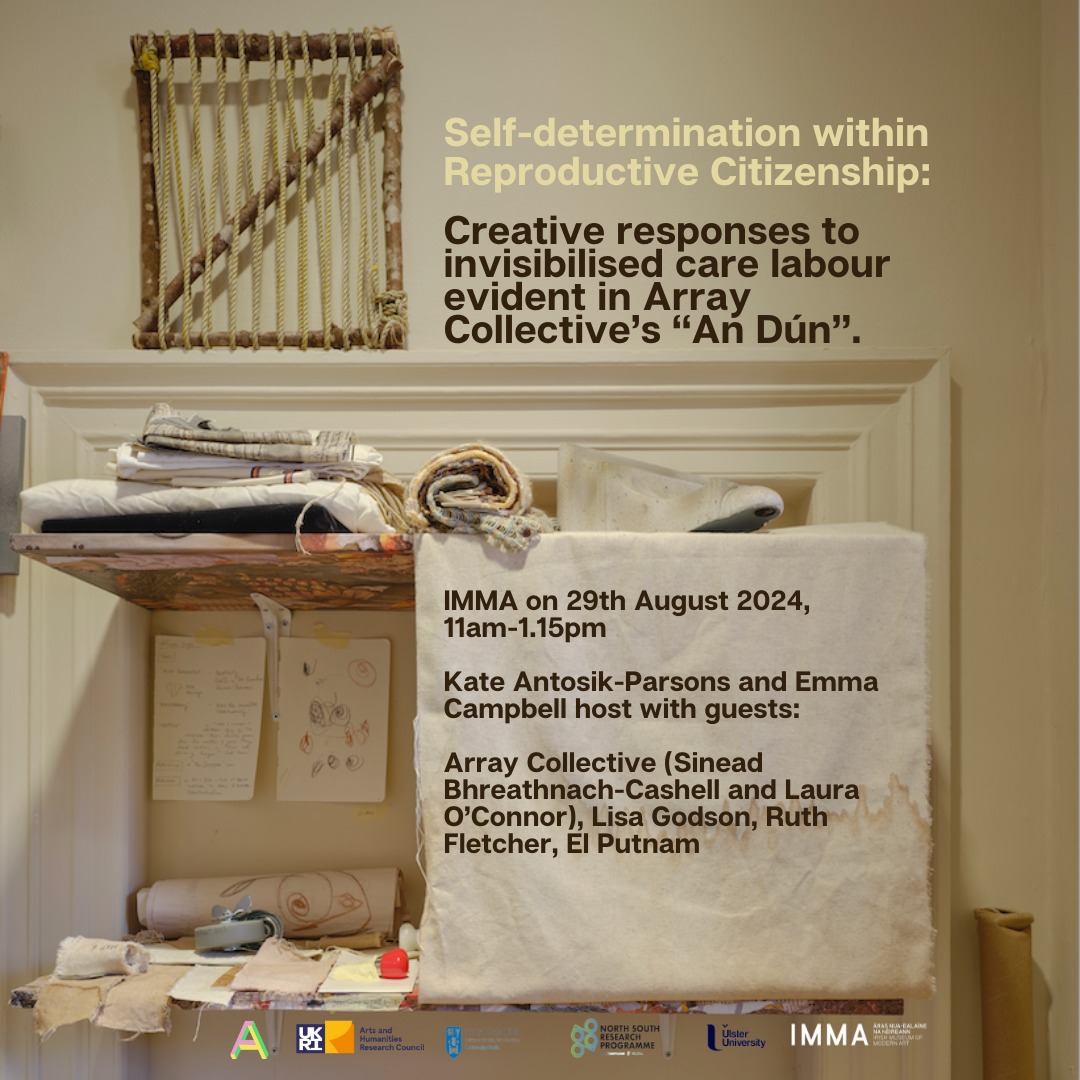
Dr Kate Antosik-Parsons (School of Social Work and Social Policy, Trinity College Dublin) and Dr Emma Campbell (School of Applied Social and Social Policy, Ulster University) of the HEA-funded North/South ReproCit Project present a public seminar on Reproductive Citizenship via provocations in response to the installation An Dún by Array Collective at the Irish Museum of Modern Art. Six artists, academics and activists will be asked to respond to the installation in advance of the seminar, where they will perform/discuss/unnerve our roles and responsibilities within a complex, evolving notion of citizenship.
After which, participating members of the public will respond in a creative workshop to the installation and provocations. The seminar hopes to develop resolutions or further questions about reproductive labour, citizenship and self-determination in a contemporary Shared Island.
Presented in Partnership with REPROCIT, a HEA-funded NSRP collaboration between researchers at Trinity College Dublin, School of Social Work and Social Policy and Ulster University, School of Applied Social and Policy Sciences.
IMMA Seminar : Self-determination & Reproductive Citizenship: https://imma.ie/whats-on/summer-at-imma-talks/
For more information on reprocit: https://reprocit.wordpress.com
Aug 26, 2024
Congratulations to Dr Catherine Conlon, Dr Kate Antosik-Parsons and Dr Éadaoin Butler on their publication "Experiences of the Irish model of community medical abortion: adherence to self-managed, people-centred abortion care".
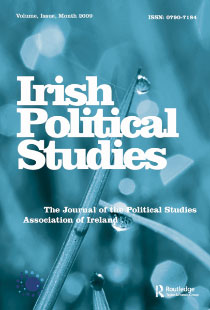 Congratulations to Dr Catherine Conlon, Dr Kate Antosik-Parsons and Dr Éadaoin Butler on their journal article in Irish Political Studies on "Experiences of the Irish model of community medical abortion: adherence to self-managed, people-centred abortion care". This article considers the operation of the Irish model of abortion care under 12 weeks gestation which has been characterised as a community medical abortion model. It draws on data gathered through 46 in-depth interviews with people accessing abortion care in Ireland under twelve weeks gestation between December 2019 and April 2021. It examines how the Irish model of community medical abortion relates to self-managed and people-centred abortion care and whether this hybrid model facilitates or circumscribes these features. The full article can be found here
Congratulations to Dr Catherine Conlon, Dr Kate Antosik-Parsons and Dr Éadaoin Butler on their journal article in Irish Political Studies on "Experiences of the Irish model of community medical abortion: adherence to self-managed, people-centred abortion care". This article considers the operation of the Irish model of abortion care under 12 weeks gestation which has been characterised as a community medical abortion model. It draws on data gathered through 46 in-depth interviews with people accessing abortion care in Ireland under twelve weeks gestation between December 2019 and April 2021. It examines how the Irish model of community medical abortion relates to self-managed and people-centred abortion care and whether this hybrid model facilitates or circumscribes these features. The full article can be found here
July 17, 2024
Congratulations to Dr Kate Antosik-Parsons, Post-Doctoral Research Fellow in Social Studies on her publication "Motherlines and Maternal Entanglements: Unravelling and Embracing the Multiplicity of Abortion, Embodiment and the Maternal".
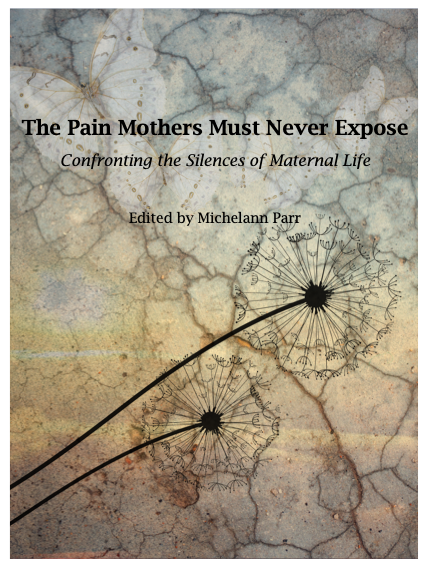 Congratulations to Dr Kate Antosik-Parsons, Post-Doctoral Research Fellow in Social Studies on the ReproCit Project on her publication "Motherlines and Maternal Entanglements: Unravelling and Embracing the Multiplicity of Abortion, Embodiment and the Maternal" in Michelann Parr (ed) The Pain Mothers Must Never Expose: Confronting the Silences of Maternal Life, Ontario: Demeter Press, July 2024. Kate's chapter reflects on the intersections between mothering, visual art, matricentric feminism and abortion. It is available here.
Congratulations to Dr Kate Antosik-Parsons, Post-Doctoral Research Fellow in Social Studies on the ReproCit Project on her publication "Motherlines and Maternal Entanglements: Unravelling and Embracing the Multiplicity of Abortion, Embodiment and the Maternal" in Michelann Parr (ed) The Pain Mothers Must Never Expose: Confronting the Silences of Maternal Life, Ontario: Demeter Press, July 2024. Kate's chapter reflects on the intersections between mothering, visual art, matricentric feminism and abortion. It is available here.
July 16, 2024
Dr Simone McCaughren leads on research project that will examine the ‘in camera’ rule in the Irish family law system

A new research project being undertaken by social policy experts in Trinity's School of Social Work and Social Policy and legal experts in University College Cork will examine the in-camera rule in Irish courts.
The in camera privacy rule in Irish family law has been a source of much debate. Whilst there appears to be a general understanding that in the family law context the in-camera rule operates to protect the identity and privacy of the parties and any children to whom the proceedings relate, the actual nature and scope of the rules application is unclear, according to the researchers undertaking the study.
The project, entitled Research examining the operation of the in-camera rule in the context of family law, will uncover how the in camera rule works in practice in Ireland and how it is experienced by those who encounter it and work within the courts.
The independent study is being conducted by Dr Aisling Parkes, School of Law (PI) and Dr Kenneth Burns, School of Applied Social Studies, from University College Cork and Dr Simone McCaughren, School of Social Work and Social Policy, Trinity College Dublin. This research has been commissioned by the Department of Justice and is an action in the Family Justice Strategy 2022-2025.
This unique study is one of the first to examine the practical operation of the in-camera rule in Irish Family Law proceedings. It seeks to provide a 360-degree view of how various stakeholders including parents, social and legal professionals, judges, researchers, journalists and media, experience the perceived limitations and strengths of the in camera rule.
The first phase of the study will involve a nationwide survey of parents who have been involved with the Irish family law system. This fully anonymous online survey aims to capture the unique perspectives of those family members with direct experiences of the family law courts in Ireland. The survey will be live until mid-August. Further phases will involve engagement with other professional stakeholders.
Dr Aisling Parkes, Senior Lecturer in Law, who is leading the research project, said: “This research is timely given the current focus on reform within the Irish family justice system. For decades now, there has been much confusion concerning the operation of the in-camera rule amongst not just families but also amongst the various professions who engage with the family law system on a daily basis. The perceived limits imposed by this rule has had significant implications for research in the area of family law which has limited potential recommendations for reform.”
Dr Simone McCaughren, Assistant Professor in the School of Social Work and Social Policy, Trinity added: “This study will capture for the first time the views and experiences of those who have engaged with the Irish family law system. The survey findings will be included in this timely and ground-breaking research to support current plans to reform our family legal system. It has the potential to have a significant impact on future family law reform by identifying the challenges and opportunities surrounding the rule’s operation.”
The online survey for family members can be accessed here: https://forms.office.com/e/ANkL9pemxK
July 8, 2024
Congratulations Prof Stephanie Holt Trinity Excellence in Teaching School Awardee
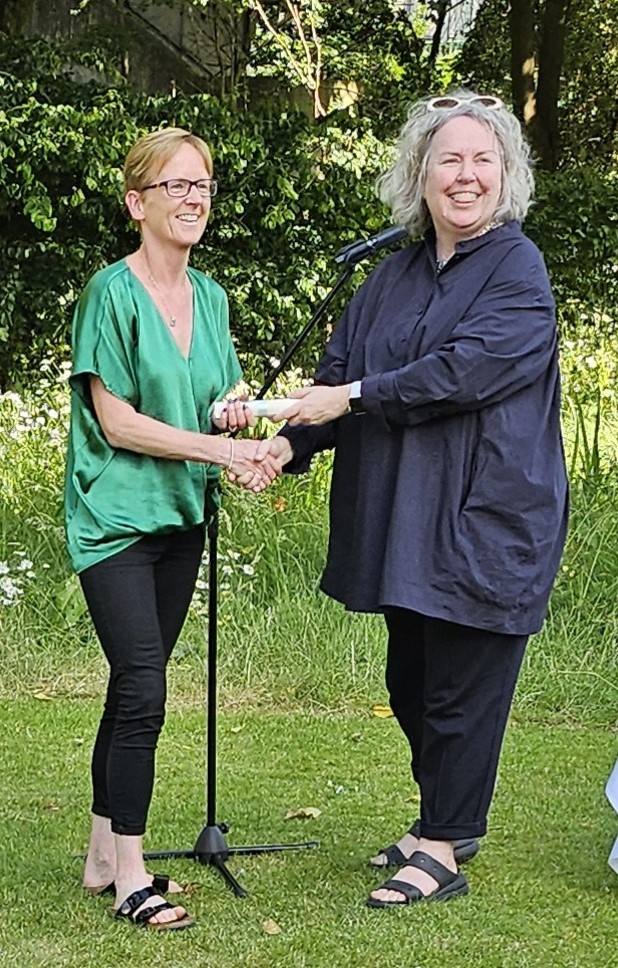
Congratulations to Prof Stephanie Holt on being presented with a Trinity Excellence in Teaching School Award by Provost Linda Doyle at a celebration of awardees in the Provost's garden. Receiving this nomination and award while serving a sixth year as Head of School is remarkable and acknowledges Steph's commitment to students and her research led teaching during her long term as Head of School.
The Award comes from a student nomination which stated:
"[Steph's] approach in sharing her knowledge and expertise was professional yet had considerable depth and left us with more questions and a hunger [for] greater understanding…each week, the lectures expanded on those questions and brought us to a really wonderful conclusion for our final lecture”.
The Trinity Excellence in Teaching Awards recognise and celebrate outstanding contribution to teaching excellence defined as achieving and sustaining outstanding quality of teaching and positive educational impact through the effective use of pedagogies that engage and enhance student learning.
June 26, 2024
Congratulations to Vitalis Bengano, PhD candidate in the School of Social Work and Social Policy
.jpg)
Congratulations to Vitalis Bengano, PhD candidate in the School of Social Work and Social Policy, who has been awarded a Government of Ireland International Education Scholarship (GOI-IES) for the academic year 2024-2025. Vitalis Bengano’s study explores the experiences of students with disabilities in accessing the built environment in Higher Education in Zimbabwe, adopting a New Materialist perspective. Vitalis Bengano’s PhD is co-supervised by Edurne Garcia and Michael Feely.
June 20, 2024
Congratulations to our Bachelor in Social Studies (Social Work) class of 2024 who graduated yesterday.

Warm congratulations to everyone who graduated yesterday. We hope you had a wonderful day celebrating your success and we wish you the very best for the future as you move on to a new and exciting chapter in your lives.
June 14, 2024
Dr Joe Whelan hosts the official launch of the Creative Pathways to Participation Project.
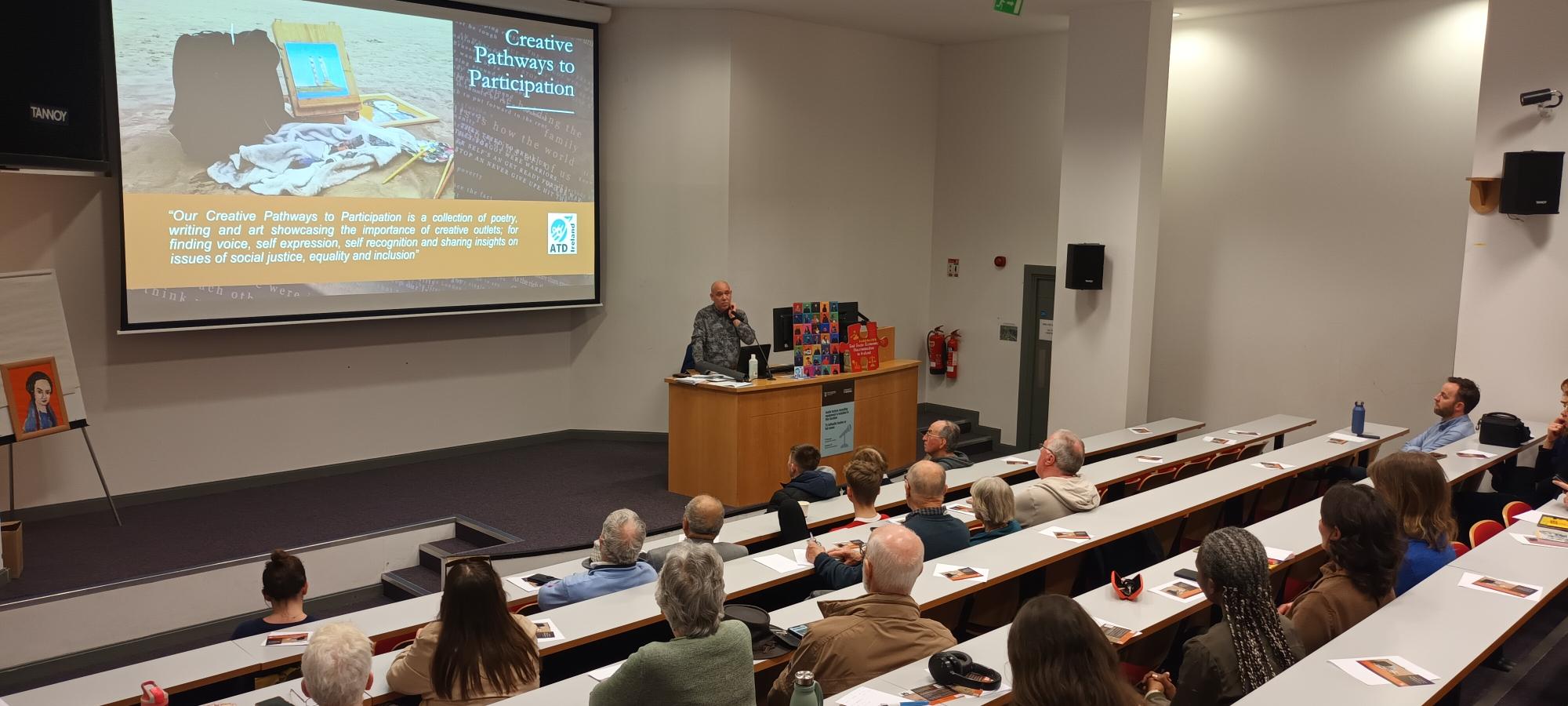
Curated by ATD Ireland, the Creative Pathways to Participation project represents a collection of poetry, writing, film and art showcasing the importance of creative outlets for finding voice, self-expression, self recognition and sharing insights on issues of social justice, equality and inclusion. The project, including a book and a short film was officially launched by Sister Bernadette McMahon in Trinity College Dublin on Tuesday 7th of May and was hosted by Dr Joe Whelan.
Overall, the project aims to shine a light on the brave efforts made by many people struggling with poverty and social exclusion to express themselves publicly and to face the barriers and inequalities head on. Developed by ATD Ireland in conjunction with Community Activists and guests it explores themes of activism, poverty, inequality, sustainability, hope, community and love.
You can find out more about the project by clicking hereand you can watch the short film by clicking here.
May 8, 2024
Congratulations to Áine Bernadette Mannion and Dr. Catherine Conlon on their publication “The Vagina Problem: A Step Too Far In Parent–Child Sex Communication With Young Children.”
 Congratulations to Áine Bernadette Mannion and Dr. Catherine Conlon on their publication “The Vagina Problem: A Step Too Far In Parent–Child Sex Communication With Young Children.” This journal article in Sex Education is a secondary data analysis of the Research With Parents project which explored barriers, enablers and the range of communication tools and strategies Irish parents employ when responding to 4- to 9-year-old’s sexuality curiosity and questioning.
Congratulations to Áine Bernadette Mannion and Dr. Catherine Conlon on their publication “The Vagina Problem: A Step Too Far In Parent–Child Sex Communication With Young Children.” This journal article in Sex Education is a secondary data analysis of the Research With Parents project which explored barriers, enablers and the range of communication tools and strategies Irish parents employ when responding to 4- to 9-year-old’s sexuality curiosity and questioning.
Áine is a graduate of two programmes in our School, BA SocSocPol and MSc Applied Social Research. Arising out of the work placement as part of ASR, and under the supervision of Dr. Conlon, this paper was completed as a Dissertation by Publication for the MSc ASR. Áine is currently undertaking her PhD, as an IRC Postgraduate Scholar in Childhood Disadvantage in Ireland at the School of Law in UCC. Publishing this article in a Q1 Social Science Journal out of her dissertation for the MSc is a huge achievement for our graduate Áine and we look forward to watching her star continue to rise!
See article at: https://doi.org/10.1080/14681811.2024.2342880
Fully Open Access on Tara: http://hdl.handle.net/2262/108337
May 7, 2024
Congratulations to Dr Kate Antosik-Parsons, Post-Doctoral Research Fellow in Social Studies
Congratulations to Dr Kate Antosik-Parsons, Post-Doctoral Research Fellow in Social Studies on the ReproCit Project, on her recent publication “Say Nope to the Pope: performance and resistance in the creative interventions during the 2018 papal visit to Ireland”. This article in Irish Studies Review examines the creative protests and interventionist actions that marked the 2018 visit of Pope Francis to Ireland. It thinks through these public actions, exploring them as public performances of protest grounded in solidarity and resistance. It can be read here.
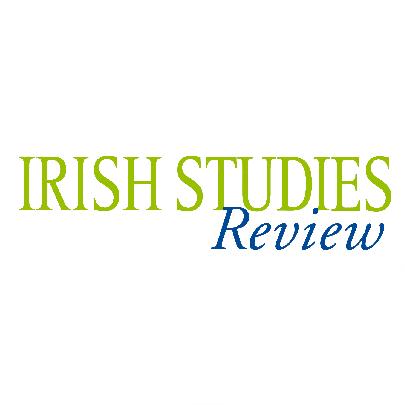
April 29, 2024
Dr Joe Whelan gives expert testimony to the Committee on Social Protection, Community and Rural Development and the Islands
Dr Joe Whelan gave expert evidence to the Committee which met on Wednesday April 24 to discuss the impact of means testing on the social welfare system. Dr Whelan was joined by Dr. Fiona Dukelow from University College Cork, Dr Tom Boland from University College Cork and Dr Ray Griffin from South East Technological University.
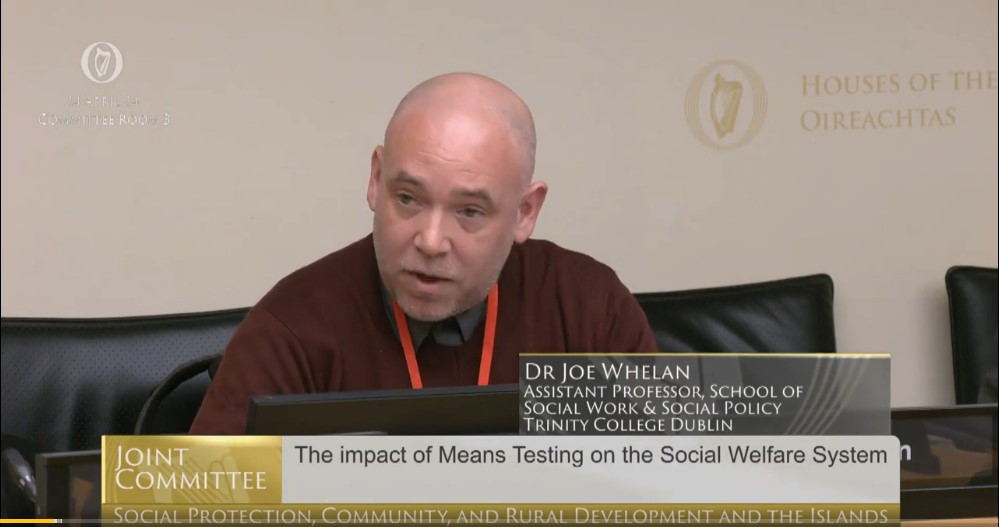
You can watch back here
April 25, 2024
Marian Lynch Medal Winners

Congratulations to our most recent Marian Lynch medal winners who were presented with their medals by course director, Joe Whelan.
This award was commissioned in 2006 by classmates of Marian Lynch, a Junior Sophister BSS student who died in May of that year. Marian greatly enjoyed her course, in particular the Community Work module which reflected her deep affection for and commitment to her own community, the Liberties.
Winners (L to R) ; Olwen Reid , Valentine De Villeneuve and Eileen Coogan were members of the group who achieved the highest mark in the Senior Fresh Community Work project 2023 .
Well done!
April 24, 2024
Laidlaw success for BSS student!

Congratulations to Bachelor in Social Studies Senior Fresh student Frøya Mostue-Thomas who has been awarded a Laidlaw Scholarship.
Awarded on the basis of a highly competitive process, the Laidlaw Scholars Leadership & Research Programme is an innovative scholarship which aims to develop a new generation of leaders who are skilled researchers. Laidlaw Scholars undertake an intensive and rewarding 18-month leadership development programme which includes opportunities for funded research and leadership experiences over two summers, skills workshops from expert facilitators, personal coaching, and a range of learning resources.
Frøya's application was supervised by Dr Joe Whelan. Joe will continue to work with Frøya over the course of her scholarship.
Read more about the Laidlaw programme here.
April 23, 2024
Congratulations to our New 2024 Trinity Fellows

Congratulations to our colleagues Dr Catherine Conlon, Dr Edurne Garcia Iriarte and Dr Susan Flynn who on Trinity Monday, were announced as new Trinity Fellows. A massive well done on a great achievement for our School to gain three esteemed fellowship appointments.
April 23, 2024
April Student Profile: Sowmia Lakkshme Sundaresan - SWSP Postgraduate Taught Scholarship Recipient and Graduate of the MSc in Applied Social Research

The School of Social Work and Social Policy was delighted to be able to catch up with one of our recent MSc in Applied Social Research graduates and Postgraduate Taught Scholarship Recepient Sowmia Lakkshme Sundaresan to discuss her experience on the MSc and how her scholarship impacted her time at TCD. The school has been offering the Postgraudate Taught Award to exceptional Non-EU offer holders since 2017 and Sowmia is one of the most receient recipeints to complete her programme. Below is her interview including advice to other prospecive students seeking awards at TCD:
- Where are you from?
I’m from India. I come from a southern city called Chennai.
- Tell us in a few sentences about your academic background and why you wanted to pursue a MSc in Applied Social Research:
I started my career working as a schoolteacher in a disadvantaged community for two years. I am passionate about education. Following this, I wanted to strengthen my understanding of education through different lenses, such as sociology, philosophy, policy, and psychology. So, I pursued an MA in Education. During the program, I was drawn by the value of empirical research and surprised by its absence in my experience as a practitioner. I pursued the MSc in Applied Social Research to develop my research skills.
- Were you considering universities all over the world or were you just looking at universities in Ireland?
I considered Ireland and one other country. But the course design and duration made me lean towards Ireland.
- How did you find out about the SWSP Postgraduate Taught Scholarship?
Ever since I applied for the program, I had been looking for scholarships (both government and private). I learned about the SWSP Postgraduate Taught Scholarship on the ARS course website.
- How did you feel when you found out you had been awarded your scholarship?
I was thrilled when I got the email. It had a significant impact on how I planned to finance my education.
- How did your family and friends react to your news about becoming a scholarship recipient?
I was amidst a group of close friends when I got the news, and they were delighted. My parents felt proud when they heard about it too!
- What was your favourite part about being a student at Trinity?
My favourite part of being a student at Trinity would be –
1. Studying or working from the Berkeley or the Lecky library with the right amount of white noise.
2. Feeling really supported and mentored by the course instructors.
3. Sitting by the cricket field at lunch during the warmer months.
- What are your ultimate career goals after having finished your course?
Before I started this course, I had a clear yet narrow idea of what I would do. But I can see that my career is unfolding into something different. I am grateful for the opportunities that are opening up now, and I’m looking forward to seeing where they take me.
- What advice do you have for other international students looking to receive a scholarship?
I would say search and apply for as many scholarships as possible. I think many people (me included) don’t apply for such opportunities due to imposter syndrome. It is vital to apply and give yourself a chance to be considered, even if you’re doubtful about your achievements or skills. You never know; you might actually get it!
__
The SWSP Postgraudate Taught Award is currently on offer to all Non-EU postgraduate applicants who hold an offer to join one of the taught programmes in the School of Social Work and Social Policy. To be considered for the 2024 award, Non-EU applicants just need to apply and receive an offer from one of our taught programmes by the award deadline of 15 April 2024. If you are interested in applying to one of our taught postgraduate programmes, please check out our postgraduate course pages.
April 4, 2024
Webinar - MSc/Postgraduate Diploma in Social Policy and Practice, April 23rd 2024

To register click here.
The ReproCit Project at the Abortion and Reproductive Justice Conference, Bangkok
The ReproCit Project presented at the “Abortion and Reproductive Justice Conference: The Unfinished Revolution IV”, hosted by Asian Safe Abortion Programme in Bangkok, Thailand at Mahidol University (15 February – 18 February 2024). The ReproCit Team consisting of Dr Catherine Conlon and Dr Kate Antosik-Parsons (TCD) and Dr Fiona Bloomer and Dr Emma Campbell (UU) all made valuable contributions to the conference.
On Thursday, 15 February, Kate Antosik-Parsons and Emma Campbell co-facilitated “Reproductive Citizenship: Arts and Abortion Utopia Workshop”. The all-island ReproCit project examined abortion art activism using reproductive citizenship. The aim of this creative two-hour workshop was to produce a toolkit on creative best practice and abortion. We convened global peers interested in abortion art activism and invited them to share developments in abortion art activism from their own contexts.

The workshop was a great success with many engaged peers who not only produced wonderful zines and creative interventions about abortion in their own contexts but also facilitated a sharing of information.

During a plenary session chaired by Anand Sinha and Rada Tzaneva and Facilitated by Fiona Bloomer, Catherine Conlon spoke on the plenary panel “Understanding Opposition and Safeguarding Rights”, alongside speakers Neil Datta, European Parliamentary Forum, Belgium and Ignatia Alfa Gloria, Youth Network Indonesia. Catherine gave insights into current abortion provision in the Republic of Ireland.



Also on 17 February, Fiona Bloomer spoke on the plenary session: “Academia, activism and everything in between: Bridging the gaps and joining the dots”, co-chaired by Prof. Kritaya Archavanitkul and Mitra Kadarsih, facilitated by Priskila Arulpragasam.
On 17 February, Kate Antosik-Parsons and Emma Campbell co-presented a paper: “Reconceptualising Reproductive Citizenship: Emerging Insights from a comparative study of abortion seekers form the island of Ireland following legalisation” on the Law and Policy panel alongside presenters from Japan, Democratic Republic of Congo and South Africa.

This presentation explored empirically articulations of reproductive citizenship through abortion seeker narratives in the wake of recent legalisation.
On the final day of the conference, Sunday 18 February, Emma Campbell gave insights on the plenary panel “Life: beginnings, endings and everything in between” co-chaired by Na Young and Suzanne Belton, facilitated by Suchitra Dalvie.

The Abortion and Reproductive Justice Conference enabled the ReproCit team to make important global connections between the project and abortion providers, advocates and scholars and we see our participation at the conference as further enriching our research.
Funding for attendance at this conference is gratefully acknowledged by Kate Antosik-Parsons from the Trinity College Dublin Research Fellows Award.
More information on the ReproCit Project and its activities is available here: https://reprocit.wordpress.com/
March 19, 2024
March Student Profile: Srimoyee Biswas - Structured PhD Programme & Government of Ireland Scholarship Recipient
Interview with a Scholar: Government of Ireland Scholarship Recipient, Srimoyee Biswas
 The School of Social Work and Social Policy is delighted to announce that our new PhD candidate, Srimoyee Biswas, was awarded the prestigious Government of Ireland International Education Scholarship (GOI-IES) to help fund her studies at Trinity. This award programme, which is open to Non-EU postgraduate students looking to study at an Irish institution, is highly competitive, with only 60 awards given per year to across all of Ireland’s universities. We are therefore very proud to have a GOI scholarship recipient among our new cohort of students! Below is an interview with Srimoyee, shedding light on her decision to come to Ireland, her journey to receiving this exceptional award and her research goals.
The School of Social Work and Social Policy is delighted to announce that our new PhD candidate, Srimoyee Biswas, was awarded the prestigious Government of Ireland International Education Scholarship (GOI-IES) to help fund her studies at Trinity. This award programme, which is open to Non-EU postgraduate students looking to study at an Irish institution, is highly competitive, with only 60 awards given per year to across all of Ireland’s universities. We are therefore very proud to have a GOI scholarship recipient among our new cohort of students! Below is an interview with Srimoyee, shedding light on her decision to come to Ireland, her journey to receiving this exceptional award and her research goals.
- Where are you from?
I am from India from the state of West Bengal. My education was in my home state till high school, and I went ahead to complete my undergraduate degree in Journalism from Bangalore and then pursue my postgraduate degree in Social Exclusion and Inclusive Policy from Jamia Millia Islamia, New Delhi.
- Tell us in a few sentences about your academic background and why you wanted to pursue a Ph.D.
My interests have always been in the arena of social sciences. After graduating from high school, I went ahead to complete my undergraduate degree in journalism and while it was a great journey, the state of the newsroom did not convince me to pursue it as a career or a wider interest. Instead, I found my calling in the more academic component which was first reflected in my undergraduate thesis. I worked on the idea of media framing in the context of the Rohingya crisis and I think this was the first time I was reading authors like Patricia Hill Collins, and it fascinated me how the gendered aspects of journalism emerged in studies and an inevitable interest started cropping up in policy. This solidified as I studied ‘social exclusion’ as a phenomenon in the context of policy for my postgraduate degree. My fieldwork in New Delhi, conducted during my stint with the New Delhi State Government, was pivotal in giving me that ‘extra push’ when it came to solidifying my resolve to pursue a Ph.D. as I visited local units of welfare delivery services (known as aanganwadis). I was simultaneously reading, understanding, and reflecting on ‘caste’ and ‘gendered identities’ and the lack of conversations/ appropriation of the same in academic spaces and everything tied together to give way to my research.
- Were you considering universities all over the world or were you just looking at universities in Ireland?
I had mainly aimed at the European universities owing to the flexibility it gave to early-career researchers to be able to dive headfirst into research. Personally, I aimed at a few universities in the UK and Trinity here in Ireland.
- Tell us in a few sentences about your research interests and the work you plan to do with your supervisor:
My research interests mainly lie in understanding the formation of policy, not necessarily at the bureaucratic level but how the everyday-ness of policy manifests and its interface with the different identities one harbours. I am particularly interested both through my work and generally in the field of education to focus on gender and ‘caste’ as two different identities that determine the welfare experience. The need to talk about ‘caste’ specifically stems from the South Asian scholarship being relegated to a place where only hyper-specialisation of caste occurs but my sincere attempt is to be able to keep talking about this in different well-established disciplines like social policy. My supervisors, both Dr Joe Whelan and Dr Catherine Conlon have worked on lived experiences and grounded constructivist theory in the context of feminist studies, respectively. Hence, the fact that they have taken me up on this opportunity just exemplifies the fact that what we will be doing is symbiotic in nature. I am learning and yet to learn so much about research methodologies and their pedagogies while they also consciously keep up with the understanding of this relatively new area of research themselves. Ultimately, I hope we will all be able to put together a study that will be innovative to understand how different groups based on their identities and lived experiences negotiate the welfare system focusing on India as a site of study.
- How did you find out about the Government of Ireland Scholarship?
The funding was listed as an ‘additional source of funding’ on the School’s webpage and by the time I was in conversation with my supervisors I flagged the need to be able to get funding to pursue my research; the idea was to cast the net as wide as possible. I later read through the website and familiarised myself with what the Higher Education Authority has to offer and the work that they have put in by working closely with the Government of Ireland to democratise education to international students and I thought of giving it a shot.
- Can you describe the application process?
The application process is entirely written, so there is no qualifying interview where say a candidate can demonstrate their interest. Hence, I felt the key was how well you can put together your ideas and thought processes into words; hence it really tests your writing capabilities. The process also requires you to have an offer from the university and the course you are applying to so it is extremely important to keep that handy. Additionally, it also requires you to have references from the individuals you have studied/ worked with. I would recommend planning this and having the conversation with the concerned individual as unlike most university/ scholarship portals it requires the applicant to upload the reference from their end instead of requesting the reference to upload it from their end onto the portal.
- How did you feel when you found out you had been awarded your scholarship?
Very relieved. I think getting a scholarship to fund my studies was extremely important to me. Education as a sector is yet to be democratised and unfortunately, it remains highly inaccessible to several students from the global south and more so the marginalised students of the global south. I still remember that I was working with United Nations Women and the news over e-mail reached me when I was in my office. Everyone in the government building where I was based in New Delhi made me feel very loved after I shared this, celebrating this victory, as one of their own! It was a great evening spent in the company of a few friends and I sincerely cherish that. However, it was also a moment of reflection on how privileged I was to even be able to have access to things like the internet, a good English education, and different social privileges which led me to the point if anything I should be thankful yet critical of my successes.
- How did your family and friends react to your news about becoming a scholarship recipient?
I was unfortunately not in the same city where my family was. I was in New Delhi while my family was back in Kolkata. They did get a phone call and they were as relieved as I was because they have quite closely seen me grapple with the uncertainty of securing funding and have always been quiet pillars of support. My friends who were in the city and otherwise were also very supportive, overjoyed, and very proud and I am thankful to them for never stopping to believe in me even at times when I found it difficult to believe in myself.
- What is your favourite part so far about being a PhD candidate at Trinity?
I think Trinity is a wonderful place to be in and apart from the campus being steeped in history, I feel generally a sense of belonging and association with the space simply because everyone is really on their unique trajectories and equally invested when it comes to others having their interests. While I am at a very nascent stage, I enjoy popping by for the mixers/ lunches with other PhD students and catching up with them. Initially one might think that a Ph.D. is an isolating journey, but I think the events organised, turning up for seminars, and attending conferences allow you to make friends and just generally find yourself in a collaborative space. I am also a Teaching Assistant and have taught undergraduate students for a term which was enriching and some of the discussions have also been very insightful. The ecosystem of learning and finding myself beyond the office desk has been interesting and one of the most enjoyable times so far.
- What are your ultimate career goals after finishing your PhD?
Ideally, I would love to take my learnings and get reabsorbed back into academia within or beyond Ireland. While I speak of this, I am very cognisant of the very real restraints within the realm and how ambitious it may sound, at this stage. However, I want to work towards facilitating the process of democratising the education system, working along the lines of identity and how they shape experiences and taking that into account building towards making the classroom spaces more inclusive. I would love to have the opportunity to work along these lines and build/strengthen the curriculum. My key insight from teaching (the little that I have) is that once a student can relate to the curriculum, it opens the possibility of making them more involved in the teaching and academic process by extension. That’s the intersection I would like to tap into and work on.
- What advice do you have for other international students looking to receive a scholarship?
Know that while it may seem intimidating after looking at the acceptance rates and the people who did make it, believe in your own unique experiences and what made you come to this point. I think when one introspects, we realise that we all have a story to tell. I think narrating that story is key. Reach out to people who have already made it into places you envision yourself and build a community, ask away and seek advice but know that someone else’s journey should never act as a template for yours. Lastly, once you get a scholarship make the conscious effort to educate and reflect on yourself, your privileges, and what led you to this point, and don’t just stop there. Start reaching out to people back home and talk to students with similar aspirations and try to find it in yourself to make time to further these opportunities, reach out to your peers, and ensure there are collaborative efforts with a shared vision that further this cause. Scholarships are a small bit but take that as an opportunity to reflect on the larger picture of life!
__
March 4, 2024
School celebrates #CareDay2024 hosting 'Embrace Our Stories' photography exhibition in partnership with Trinity Access Programme
The School of Social Work and Social Policy, in partnership with the Trinity Access Programme, were delighted to mark #CareDay2024 hosting the ‘Embrace Our Stories’ photography exhibition curated by Empowering People in Care. The exhibition showcased photographs taken by care-experienced children and young people and can be viewed virtually here: Embrace Our Stories Photography Exhibition - a virtual tour - YouTube






21st February, 2024
Care leavers ten years on — first phase of landmark study commences
Posted on: 15 February 2024
Ground-breaking research study to transform our understanding of how adults fare after leaving the state care system
Minister Roderic O’Gorman met with the research team leading a major new study exploring the experiences of young adults who have left the Irish care system.
The study, Care Leavers – Ten Years On, will be the first in Ireland to address the experiences of ‘graduates’ of the care system in adult life, in terms of education, family, work, accommodation, health and well-being.

The study is being led by a research team from Trinity College Dublin in partnership with University of Sussex. Phase one of the study is now underway and will involve work to secure ethical approval, a review of relevant international research findings, and extensive consultation with care leavers and those providing after care and support services to ensure the best possible study.
Funded by the Department of Children, Equality, Disability, Integration and Youth, the study is part of Care Experiences: Journeys through the Irish Care System, a new national research and data project examining the lives of children in care and adults who were in care as children.
This two-year study, which will be completed by end of September 2025, will investigate how young people who leave the care system fare as adults; what makes a difference in supporting care leavers, and what is important from their point of view.
Welcoming the commencement of the study, Minster for Children, Equality, Disability, Integration and Youth Roderic O’Gorman said: “I want to congratulate the team on their progress to date in preparing for this innovative study, and I would also urge care leavers to take part in the upcoming consultations on how best to design the study. This will help to ensure that it reflects the experiences of as many care leavers as possible.”
The research team for Care Leavers – Ten Years On is led by Professor Stephanie Holt and Professor Emeritus Robbie Gilligan from the School of Social Work and Social Policy, Trinity, in association with Professor Janet Boddy, School of Education and Social Work, University of Sussex.
Assistant Professors Eavan Brady and Joe Whelan (School of Social Work and Social Policy, Trinity) and Dr Sarah Parker (School of Medicine, Trinity) complete the team.
Commenting on the new study, Professor Holt said: “We are delighted to have such a strong inter-disciplinary and inter-institutional research team working on this innovative study. Our findings will provide the first clear evidence from Ireland on how people who left foster or residential care in the past ten years or so are doing in their late twenties."
Professor Robbie Gilligan, Trinity, added: “This evidence will be invaluable for Tusla – Child and Family Agency as it plans services for children in care, and also as they develop their after-care programmes alongside other relevant public bodies. Importantly, the study will also contribute to international knowledge in this key area.”
Care leavers / care experienced adults who wish to take part in the upcoming consultation process for the design of the study should emailcareleaversstudy@tcd.ie to find out more. Alternatively, they are also very welcome to email their suggestions for any questions or topics to be covered in study interviews.
19th February, 2024
February Student Profile: Jianing Zhu - Structured PhD Programme & China Scholarship Council Recipient
Interview with a Scholar: China Scholarship Council Recipient, Jianing Zhu.
 In 2023 the School of Social Work and Social Policy was delighted to hear we would be hosting a China Scholarship Council award recipient and PhD candidate. Ms. Jianing Zhu joined the school in September 2023 becoming one a few fully funded CSC students at Trinity College Dublin. We were fortunate enough to catch up with Jianing for an interview discussing her award, how she ended up in Ireland and her research interests in the school:
In 2023 the School of Social Work and Social Policy was delighted to hear we would be hosting a China Scholarship Council award recipient and PhD candidate. Ms. Jianing Zhu joined the school in September 2023 becoming one a few fully funded CSC students at Trinity College Dublin. We were fortunate enough to catch up with Jianing for an interview discussing her award, how she ended up in Ireland and her research interests in the school:
- Where are you from?
I come from Jinhua, Zhejiang Province, CHINA.
- Tell us in a few sentences about your academic background and why you wanted to pursue a PhD:
I obtained a bachelor’s degree in Urban Management at Ningbo University of Technology. In addition, I obtained a Master’s degree in Social Policy at The Chinese University of Hong Kong this year.
I’ve enjoyed my academic work so far, but I feel like I don’t have sufficient time to research deeply, so to do a PhD is an appropriate option. The PhD journey, will take me to the edge of human knowledge, of course, in my research field. I am interested in social work and social policy, and I possess the passion to find out more create a better human society through my own specialty, so that I can make some contribution to this world, although its values may appear in many years later. So, I think that is meaningful and interesting to explore the path I like, especially a path that relates closely to the society. It is such a positive and inspiring thing. Of course, there are any other reasons like, gaining a doctorate degree enables me to gain a sense of achievement. However, I believe that my passion and my curiosity is the most crucial reason to make the decision to pursue a PhD.
- Were you considering universities all over the world or were you just looking at universities in Ireland?
To be honest, TCD is the only university I considered and applied. Actually, from my perspective, TCD gives me a strong sense of belonging. People here, including my supervisors and executive Officer I got access to are very friendly, patient, inclusive and passionate. I feel warm, supportive and delighted when I keep in touch with them.
Furthermore, Ireland is an ideal place for social research for its unique social welfare system and abundant academic resources, and this structured PhD programme attracts me because of its rigorous research standards and innovative discoveries. I am eager to explore more about the essence, roles and experiences of social policy and social work through gaining advanced knowledge from PhD courses, seminars, workshops and fieldwork in such an inclusive and diverse academic environment. I believe the future academic training here will definitely maximise my potential and lead me to further opportunities.
- Tell us in a few sentences about your research interests and the work you plan to do with your supervisor:
I have keen interests in ageing and care, social policy, social welfare and qualitative research methods. For my PhD thesis, I plan to investigate and understand the experiences of senior volunteers participating in time banks in Shanghai, with a focus on the motivations, challenges, personal perceptions and social interactions associated with their engagement.
Me and my supervisors made a detailed plan for my 4-year PhD studies that almost covered everything, including thesis drafting, publication, supervision, and programme attendance.
- How did you find out about the China Scholarship Council Award?
It is one of the most renowned scholarships between Chinese PhD Scholarships applicants. I heard about it several years ago, it not only provides scholarships to abroad PhD students, but also to interns at international organisations.
- Can you describe the application process?
I completed my online application in January 2023. Thanks a lot to Michelle! She introduced me to my supervisors Dr Catherine Elliott O’Dare and Dr Catherine Conlon. Then we had an informal meeting. Afterwards, I devoted myself into the two-rounds CSC Award preparation and I received the award in June 2023.
- How did you feel when you found out you had been awarded your scholarship?
No pain, no gain! I’m so proud of myself. I'm glad that all my efforts paid off. I’m also grateful to all my supervisors and friends who helped me to apply for this PhD scholarship. Many thanks to my country for providing me with living expenses and Trinity for exempting my tuition fees!
- How did your family and friends react to your news about becoming a scholarship recipient?
My family and friends are very proud of me, and I received their warm blessings and encouragement. This scholarship really saved me and allows me to focus on my interested research rather than worrying about living costs.
- What is your favourite part so far about being a PhD candidate at Trinity?
My office room in Fosters Place! I love my cozy and comfortable office room so much! It provides me with a private space for my research and living, just like my second home. I come to my office almost every weekday.
- What are your ultimate career goals after finishing your PhD?
As for my career goal, after graduation, I plan to pursue research-related positions in academia. This path might include receiving post-doctoral training to further refine my independent research experience and skills, or becoming a lecturer to impart knowledge to the younger generation and kindle their interests in the social work and social policy field. During my lifetime, I will continuously reflect on the opportunities and challenges of social work in solving social problems and meeting needs under changing social conditions, with emphasis on the plight of vulnerable groups in society.
- What advice do you have for other international students looking to receive a scholarship?
Securing a scholarship as an international student can be competitive, but with careful planning and strategic efforts, you can increase your chances of success. First of all, I would say that identifying scholarships that align with your field of study, interests, and background is very important, just look extensively for local and international scholarship opportunities. Secondly, start your preparation as early as possible. You need to make a detailed plan for your PhD and scholarship application. Most scholarship applications have early deadlines. If you miss the scholarship deadline, this means that you have to wait until next year. Thirdly, remember to maintain a strong academic record and strive for excellence in your studies. In addition, remember to craft a research proposal and an impressive personal statement, which can demonstrate your research potential, sincerity, and uniqueness. Finally, you can connect with current scholarship recipients, alumni, and professionals in your field and seek advice from them. Anyway, persistence is the key. Good luck to you all!
More information on the China Scholarship Council (CSC) – Trinity College Dublin Joint Scholarship Programme can be found on the university’s study website. Trinity is now inviting applications for the 2024 CSC-Trinity College Dublin Joint Scholarship Programme. The deadline for applications is 23 February. If you are a prospective PhD student, we encourage you to have a look at our Structured PhD course page!
6th February, 2024
Transitions on Hold? How the Covid-19 pandemic affected young people's transitions to autonomy

A new EU- Council of Europe Youth Partnership Youth Knowledge Book "Transitions on hold? How the Covid-19 pandemic affected young people’s transitions to autonomy" has been launched. The book was co-edited by PhD researcher Amy Stapleton, a member of The Pool of European Youth Researchers (PEYR).
29th January, 2024
Tusla Sponsorship Programme for the TCD Masters in Social Work

We are delighted to announce a Tusla sponsorship programme for a Masters in Social Work. This involves Tusla funding of €5k toward each academic year with a commitment to take up a full-time permanent position with Tusla for a minimum of 3 years upon completion. For more information please see: tusla.ie/msw
15th January, 2024
Abuse survivors’ experience of family law focus of new research
/prod01/channel_3/media/tcd/news-images/shutterstock_2251369965.jpg)
A nationwide survey of parents who have been involved with the Irish Family Law systems in situations of domestic violence and abuse has been launched today [Jan 8th, 2024].
The research study is being undertaken by Trinity College Dublin in collaboration with Women’s Aid and is the first study in Ireland which specifically seeks both adult and child victims and survivors’ perspectives of the Irish Family Law system when domestic violence and abuse is also a factor.
The study will provide a 360-degree view of how effectively guardianship, custody and access proceedings in the Irish Family Law system respond to the safety and wellbeing requirements of adult and child survivors.
Professor Stephanie Holt, Principal Investigator from the School of Social Work and Social Policy, Trinity, said:
“This study will capture, for the first time, the views and experiences of adult and child survivors of domestic violence and abuse about their experience of the family law system. These unique insights will be invaluable in supporting the reform of family law in Ireland.”
The nationwide online survey will focus on what adult victims and survivors of domestic violence and abuse, including coercive control, say about their experience of navigating the Irish Family Law system. It will also seek to better understand how the voice of the child who is a survivor of domestic violence and abuse is heard in family law cases concerning guardianship, custody, and access.
This fully anonymous online survey aims to capture the unique perspectives of adult and child survivors of domestic violence and abuse in cases of guardianship, custody, and access. The study also seeks to understand what helped and hindered adults and children when going through legal processes since the enactment of the Child and Family Relationships Act 2015.
Sarah Benson CEO of Women’s Aid added:
“As a national frontline service operating for 50 years in Ireland Women’s Aid know that domestic abuse shows up in every aspect of a victim/survivor’s life: at home, in work, at school and particularly in our family courts system. This is an unprecedented opportunity to capture this experience where children are particularly involved.
"The survey findings will be included in this groundbreaking and timely research to contribute to current plans to reform our family law and justice systems. These plans must be victim-survivor informed at every stage, and this will help us ensure that their voices are heard.”
The research team want to hear from all victims and survivors of domestic violence and abuse about their experiences, and those of their children. This includes both male and female survivors, survivors with a disability, migrants and asylum seekers, minority ethnic backgrounds and LGBTQ+ communities and from all over Ireland.
The study is funded by Women’s Aid and is being conducted by researchers from Trinity’s School of Social Work and Social Policy and colleagues in University College Cork.
This online survey forms one phase of the broader research study. Findings from this study will provide an evidence base to feed directly into the legal reform process, which aims to improve the Family Law system in Ireland for future users.
The survey, which will be live until the end of February 2024, will take approximately 30 minutes to complete and can be done on any device. It can be accessed here: https://tcdecon.qualtrics.com/jfe/form/SV_es1um6KOQ5SoPHw
9th January, 2024
An Exploration of Hygiene Poverty in Ireland.
 New research led by Dr Joe Whelan was launched yesterday at the Irish Human Rights and Equality Commission Event Space.
New research led by Dr Joe Whelan was launched yesterday at the Irish Human Rights and Equality Commission Event Space.
This research was commissioned by Hygiene Hub and funded by the Irish Human Rights and Equality Commission (IHREC). It was officially launched by IHREC Chief Commissioner, Sinead Gibney. The research explored hygiene poverty in Ireland using a mixed methods approach.
The full report and an executive summary can be accessed here. The research was also covered on RTE Drivetime and you can listen back here. Finally, the research is covered in the Irish Times and the article can be accessed here.
29th November 2023
School of Social Work and Social Policy staff along with our Tusla Colleagues wins European Social Services Award for child-centred research
Trinity’s School of Social Work and Social Policy and the child and family agency Tusla have received a 2023 European Social Services Award for research published earlier this year about children’s experience of the Irish child protection and welfare service.
Through the Eyes of the Child: A Study of Tusla Child Protection & Welfare Intervention was co-authored by Prof. Stephanie Holt (pictured below on left with Tusla's Cormac Quinlan and Edel Tierney), Prof. Robbie Gilligan, Dr. Louise Caffrey and Dr Eavan Brady on behalf of Tusla. The research engaged with 20 children and young people.

The 2023 Research and Evaluation award was given at a European Social Network awards ceremony in Zagreb, Croatia.
Judges noted that “internationally, relatively few examples of research exist that represent the authentic voice of the child in the child protection system”.
“The study focused on gaining an understanding of children’s experiences but also went beyond that to understand, from the child’s perspective, what contributed to these experiences and employed qualitative methods, involving semi-structured individual interviews.
“The findings of the research led to the introduction of staff trainings and a commitment that key recommendations agreed with the children and their families would be used to inform future policy and research work.”
27th November 2023
Dr Catherine Conlon will attend the joint Oireachtas Committee on Health today to discuss Abortion Care
 Dr Catherine Conlon Associate Professor will attend the Joint Oireachtas Committee on Health today, October 18th starting at 9.30am to assist the Committee in their consideration of the Report of the Review of the Operation of the Health (Regulation of Termination of Pregnancy) Act 2018. This reflects Dr Conlon's unparallelled expertise in this area with extensive original research across her career regarding perspectives and needs of people seeking abortion care.
Dr Catherine Conlon Associate Professor will attend the Joint Oireachtas Committee on Health today, October 18th starting at 9.30am to assist the Committee in their consideration of the Report of the Review of the Operation of the Health (Regulation of Termination of Pregnancy) Act 2018. This reflects Dr Conlon's unparallelled expertise in this area with extensive original research across her career regarding perspectives and needs of people seeking abortion care.
18th October 2023
Lived experiences of poverty in Dublin mapped out in walk-and-talk study

A report entitled Walking, Thinking and Talking: An exploration of the lived experiences and hidden geographies of poverty using walking as a participatory arts methodology, was recently launched in the Irish Human Rights and Equality Commission by Author Dr Joe Whelan, Assistant Professor, School of Social Work and Social Policy, Trinity College Dublin.
This research which was funded by the Irish Research Council and conducted in partnership with All Together in Dignity (ATD) brought together a number of community activists who have experienced poverty firsthand. Together with Dr Joe Whelan, participants took part in a walking interview along a route that meant something to them. They drew pictures and maps. They took photos, and they talked about the reality of poverty in their lives.
The report, maps and photographs are available to view on the project website here. The project also involved the production of a short animated film using the testimony captured during the walking interviews and this is also available on the project website.
Further information also available here https://tinyurl.com/mwdnpz47
12th October 2023
Dr Stephanie Holt presents at The 5th European Conference on Domestic Violence

The 5th European Conference on Domestic Violence was held in Reykjavík Iceland 11-13 Septemeber 2023. Professor Steph Holt (Head of School) is pictured here addressing the audience during the opening ceremony of the ECDV’s largest conference to date with 860 delegates, including a growing representation from Ireland. Steph was Co-Chair of the Scientific Programme for the conference and is also one of a small group of seven academics/researchers who have been organising the ECDV since it’s inception in 2015. The organising committee includes Professor John Devaney (University of Edinburgh); Professor Nicky Stanley (University of Central Lancashire); Professor Christin Barter (University of Central Lancashire); Professor Carolina Overlien (University of Stockholm) and Davina James Hanman (Independent Consultant and Visiting Researcher, Trinity College Dublin). The 6th ECDV is planned for Barcelona September 1-3 2025.
19th September 2023
Domestic Violence and Child Protection: Training for Child Protection and Welfare Practitioners - Micro-credential

The application link is open until Tuesday 12th September 2023. To find out more about the course and apply, click here
8th September 2023
Congratulations to Dr Eavan Brady on her recent publication in the American Journal of Orthopsychiatry

Congratulations to Assistant Professor Eavan Brady on her recent publication with colleagues from the ‘International Research Network on Transitions to Adulthood from Care’ (INTRAC) entitled ‘Widening the care gap? An international comparison of care leaving in the time of COVID-19.’ This paper, published in the American Journal of Orthopsychiatry, reports on findings of an international survey that explored the range of policy and service responses that were implemented around the world to support care leavers during COVID-19. The abstract can be viewed here.
7th August 2023
Domestic Violence and Child Protection Conference 8th September - SOLD OUT!

We have now reached capacity at the venue, so we had to close ticket sales. If you didn’t get a chance to get your ticket, please watch out on our School website for announcements of any similar upcoming events.
2nd August 2023Position of Professor of Social Work & Social Policy

The School of Social Work and Social Policy are delighted to announce that the position of Professor of Social Work and Social Policy is now open for Applications.
Please click on the link below for more information:
https://www.tcd.ie/vacancies/professor-of-social-work-and-social-policy
05th July 2023
Congratulations to Dr Eavan Brady on Publication

Congratulations to Assistant Professor Eavan Brady on her recent publication with Dr Kristen Lwin from the University of Windsor, Ontario entitled ‘Unpacking evidence-based practice in social work education: a scoping review’. This paper explores theintersection of how evidence-based practice has been conceptualised and taught in social work education and was published in ‘Social Work Education: The International Journal’. The abstract can be viewed here
July 5th, 2023
Congratulations To Dr Edurne Garcia Iriarte
.jpeg)
Congratulations to Dr Edurne Garcia Iriarte who was selected as the recipient for the 2022-23 Award for Excellence in Supervision of Research Students in the Early Career Award category for the AHSS Faculty! Edurne was nominated by her PhD student Vitalis Bengano, with the nomination supported by Ms Jennifer O'Toole, Head of School and Dr Erna O'Connor Director of Teaching and Learning Postgraduate. This was a robust process of evaluation involving two review processes. A fantastic honour to be nominated, and an amazing achievement to be selected.
Dr Edurne Garcia Iriarte received her award at a ceremony recently hosted by the Provost.
June 29, 2023
Congratulations to our Master in Social Work class of 2023 who graduated on Friday 16th June!

Wishing you all the very best for the future.
June 29, 2023
Congratulations to our Bachelor in Social Studies (Social Work) class of 2023 who graduated last Thursday.

We hope you enjoyed your special day.
June 19, 2023
Dr Catherine Conlon attends the Oireachtas Joint Committee on Health

Dr Catherine Conlon, Associate Professor in the School of Social Work and Social Policy was invited to attend the Oireachtas Joint Committee on Health on Wednesday, 31st May to assist the Committee in their consideration of the Report of the Review of the operation of the Health (Regulation of Termination of Pregnancy) Act 2018. She attended along with Marie O'Shea BL Chair and author of the Independent Review of the Operation of the Health (Regulation of Termination of Pregnancy) Act 2018
A review clause was included in the Health (Regulation of Termination of Pregnancy) Act 2018 to monitor the operation of the legislation in practice and the delivery of services in the area. Dr Catherine Conlon's research study Unplanned Pregnancy and Abortion Care (UnPAC) formed one of three strands of evidence informing the Review carried out by Marie O'Shea.
Speaking ahead of the meeting, Committee Cathaoirleach Deputy Seán Crowe said “the Report gives our Committee the opportunity to review this important legislation. Our Committee will use the Review as an opportunity to assess the Report, particularly in relation to how the current system is working and how it can be improved. The Committee is generally anxious to see that the legislation is working as was intended, and that women needing to avail of services for the termination of pregnancy should be able to have access to those services without undue restrictions or obstacles.”
Video of the proceedings of the Committee is available at: https://www.oireachtas.ie/en/press-centre/press-releases/20230530-joint-committee-on-health-to-meet-for-consideration-of-the-report-of-the-review-of-the-operation-of-the-health-regulation-of-termination-of-pregnancy-act-2018/
June 01, 2023



